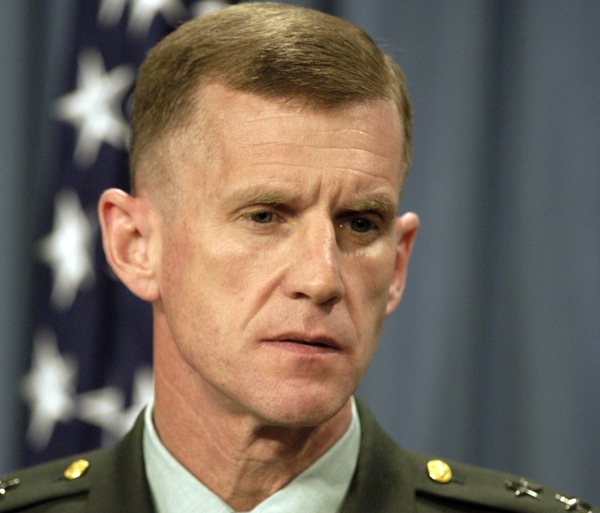McChrystal Paints Bleak Picture of Afghanistan War
President Obama’s pick to lead war effort said time on the ground is critical to provide specific answers on key issues.
Jul 31, 20208K Shares445.3K Views
Army Lt. Gen. Stanley McChrystal (defenselink.mil)
Army Lt. Gen. Stanley McChrystal painted a bleak picture of the Afghanistan war that President Obama has asked him to command in his Tuesday morning confirmation hearing before the Senate Armed Services Committee.
McChrystal, who earned both accolades and controversy during a five-year tenure as commander of the Joint Special Operations Command, warned that U.S. casualties are likely to increase in the wake of an expected U.S. push into southern Afghanistan. He said the United States needed to show significant progress within “18 to 24 months” or risk the war spiraling out of control. Urging patience for a long counterinsurgency campaign, McChrystal said, “I believe it is winnable, but I don’t believe it will be easily winnable.” He added, “There will be mistakes along the way.”
Illustration by: Matt Mahurin
On key issues facing the war, McChrystal asked for additional time and on-the-ground experience before rendering a verdict. He said he did not know if U.S. troop levels, recently increased by Obama, were sufficient to confront Afghanistan’s heightened levels of violence, “and it may be some time before I do” have an answer. While the administration has set a goal of supporting a 134,000-member Afghan Army and 82,000-member police force over the next two years, McChrystal said larger numbers of soldiers and police are necessary, though he said he did not yet know what a sensible and achievable total size is for the Afghan security forces. In April, McChrystal led a review of war strategyfor the chairman of the Joint Chiefs of Staff, Adm. Michael Mullen.
Several senators praised McChrystal effusively, even as committee staffers spent time during the past few weeks vetting whether or not McChrystal knew about abuses of Iraqi and Afghan detainees committed by Special Operations Forces under the general’s former command. One former interrogator who worked with McChrystal’s forces in the hunt for a top Iraqi terrorist told committee staffers that McChrystal’s record warranted scrutiny. But only one senator, panel chairman Sen. Carl Levin (D-Mich.), asked McChrystal about the incidents, which have been documented by Human Rights Watch. Anticipating such concerns, McChrystal sent the committee a letter yesterdaypledging fidelity to the Geneva Conventions. “I will ensure our Soldiers continue to provide custody with dignity and respect for every detainee with a dedication to modeling and maintaining world class standards,” he wrote, adding in testimony that “I do not and have not condone the mistreatment of detainees and I never will.”
Although McChrystal comes from a background in special operations and oversaw task forces charged with manhunts for specific high-value terrorists, he repeatedly emphasized how his approach in Afghanistan would be guided by “classic counterinsurgency” precepts, such as protecting the population from insurgent assaults, rather than focusing primarily on killing and capturing insurgents. A “military-centric” strategy would not succeed, he told senators, and pledged to review “all” standard practices and rules of engagement to minimize civilian casualties, which have outraged Afghans and jeopardized the United States’ relationship with the Karzai government. Losing the support of the Afghan population would be “strategically decisive,” McChrystal said, meaning the war would be lost, and said he believed that adverse perceptions of the U.S. caused by civilian casualties is “one of the most dangerous enemies we face” in Afghanistan. Success will ultimately be measured by “the number of Afghans shielded from violence.”
The ultimate goal of U.S. strategy in Afghanistan and Pakistan should be the “reduction, [and] hopefully the complete elimination of al-Qaeda inside Pakistan,” or at least the “reduction of their ability to operate transnationally,” McChrystal said. The U.S. in Afghanistan needed to out-govern the Taliban, removing what he called the Taliban’s “shadow government,” in which the insurgency collects taxes, administers a form of justice and provides services to the populace. He credited a subordinate with the insight that the “challenge in Afghanistan is to make [the Taliban] irrelevant,” something that would be accomplished through “steady growth” economically, “underpinned by a solid government,” rather than merely killing or capturing insurgents.
While McChrystal did not express outright skepticism about the prospect for reconciling Taliban fighters with the Afghan government — he said there was a greater likelihood of “fractur[ing] the Taliban” by sowing divisions within the insurgent coalition than there was of dividing the Taliban from al-Qaeda — he said he found it “very unlikely” that the Taliban would accept the precondition of abandoning its al-Qaeda partners that the government has set for accepting the Taliban as a political entity. An Afghan “working coalition might have former Taliban” within it, but “right now I can’t see them being credible” partners for governance. Reconciliation with what the Afghan government has called “mid-level Taliban” — that is, those not connected to al-Qaeda — is one of the government’s highest priorities.
McChrystal praised his friend Karl Eikenberry, the former commanding U.S. general in Afghanistan and current U.S. ambassador in Kabul, and said he hoped to work with Eikenberry on an integrated military-civilian plan for unified action in Afghanistan by the summer. Additionally, he expressed a desire to place a new deputy commander, Lt. Gen. David Rodgriguez, as operational commander in charge of the various regional commands that comprise the NATO mission in Afghanistan — a move that would make the U.S.’s command structure in Afghanistan, long criticized for its lack of organizational unity, more like the much-praised structure of the Iraq war effort — but conceded that he would need to consult with NATO member countries before such a command change could be instituted.
The general faced no opposition during the hearing, despite controversy emerging in the blogosphere about McChrystal’s role overseeing task forces in Iraq and Afghanistan that used abusive interrogation techniques on detaineesand his role in erroneously asserting that Pat Tillman, the former Arizona Cardinal and Army Ranger killed in Afghanistan by friendly fire in 2004, was killed by hostile forces. When questioned by Levin about detainee abuse, McChrystal conceded that the task forces he oversaw from 2003 to 2008 had received interrogation instructions from a December 2002 memorandum from then-Defense Secretary Donald Rumsfeld authorizing such techniques as stress positions, the use of dogs and nudity. Without providing any specificity, McChrystal said that “constant improvement” in refining interrogation techniques with which he was “uncomfortable” eventually produced an interrogation regimen “I could be more proud of.” No senator followed up Levin’s line of query.
On Tillman, McChrystal conceded error in recommending Tillman for a posthumous combat citation even when he had reason to suspect the Ranger died as the result of friendly fire. He said that although he and his chain of command acted with good intentions in seeking to award Tillman a Silver Star, his actions “produced confusion at a very tragic time” for Tillman’s family, and pronounced himself “very sorry for that. Tillman’s father has accusedMcChrystal of participating in a cover-up.
McChrystal testified alongside two other high-ranking officers nominated for important command positions: Adm. James Stavridis, who would become the first U.S. Navy admiral to serve as NATO supreme allied commander, and Lt. Gen. Douglas Fraser, who would become the first Air Force general to serve as U.S. Southern Command chief.

Hajra Shannon
Reviewer
Latest Articles
Popular Articles

